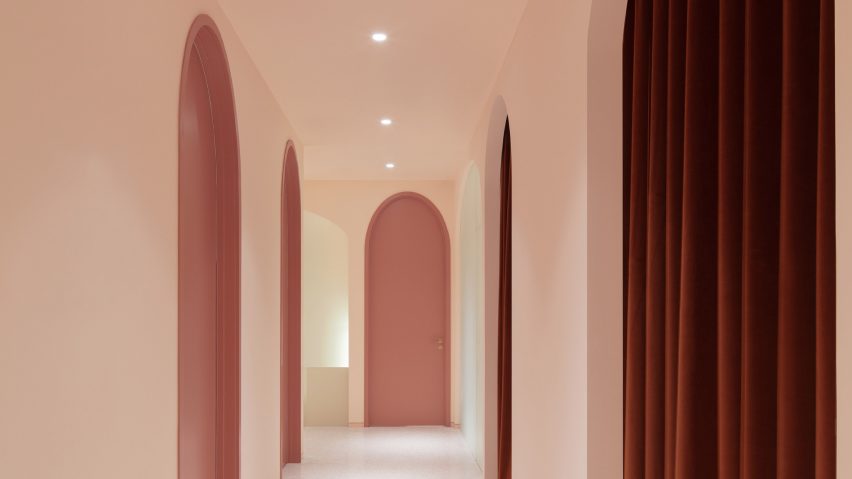Pale pink surfaces meet arched doorways inside this rose-tinted beauty salon in Beijing, China, designed by architecture studio Penda China.
Ecnesse – which specialises in using high-end beauty and skincare products – already has a host of salons dotted across China, with each featuring a different fit-out.
Penda China were approached to overhaul five of the brand's salons, creating visually-unified interiors that were "simple, transparent, bright and cheerful".
The branch in Xiangyun, a residential area of Beijing, has been decked out almost entirely in pink – an attempt by the studio to avoid the "monotonous" white interiors typically created for beauty stores.
Flecked, rose-coloured stone has been used to craft the service counter in the salon's entrance lobby, above which a trio of spherical pendant lamps is suspended.
The stone has also been applied across the floor and to the countertops of tables dotted throughout the space.
Each table is surrounded by wood-framed chairs with pale grey or blush-tone seat cushions, where customers can sit and wait or have short consultations with members of staff.
Other than a couple of shelving units that extend up from the floor on thin brass poles, decoration has been limited to leafy potted plants.
A small office-area can be seen through a huge arched window that's been punctuated in a partition wall.
Arched forms have been incorporated throughout the salon to create a cave-like aesthetic, which the studio hopes will foster a cosy sense of belonging amongst visitors.
Vaulted frames separate a sequence of alcoves where pedicures are done, dressed with muted red lounge chairs.
Curved doors made from frosted glass have then been used to conceal private treatment rooms. Inside, small arched mirrors are leant up against the wall.
"We created a sense of rhythm and a little bit of mystery with curves," explained the studio.
"These repeated core elements serve as a formal language to strengthen people's impression of the brand and enhance visual recognisability."
Further rooms towards the rear of the space are accessed via tall arched doorways, some of which are covered with blood-red velvet curtains. The salon's main entrance door has also been made curved in shape.
Penda China is headed up by architects Dayong Sun and Shuyan Wan.
Sun also co-leads architecture firm Penda that he founded with Chris Precht in 2013. Sun and Precht continue to work together on Penda projects, whilst pursuing other projects as Penda China and Studio Precht respectively.
Chris Precht founded Studio Precht, an Austrian architecture practice that he leads with his wife Fei Precht, that typically works on residential projects.
Last summer, Penda unveiled designs for a residential tower in Tel Aviv with modular archways and terraces designed to reflect the Bauhaus legacy of architecture in the city.

